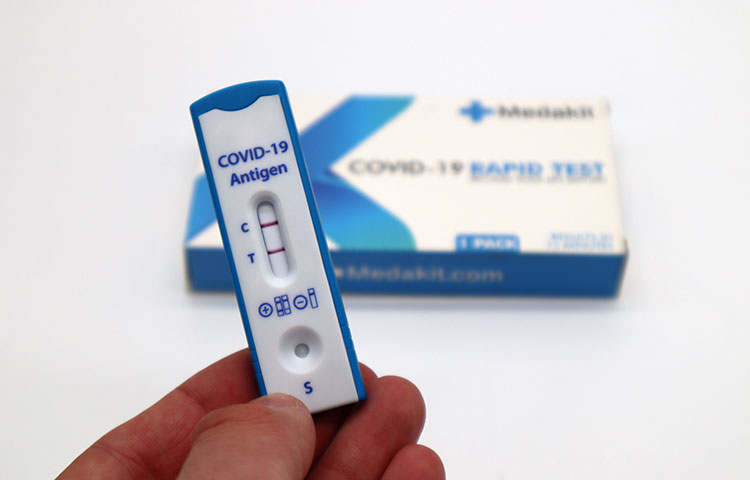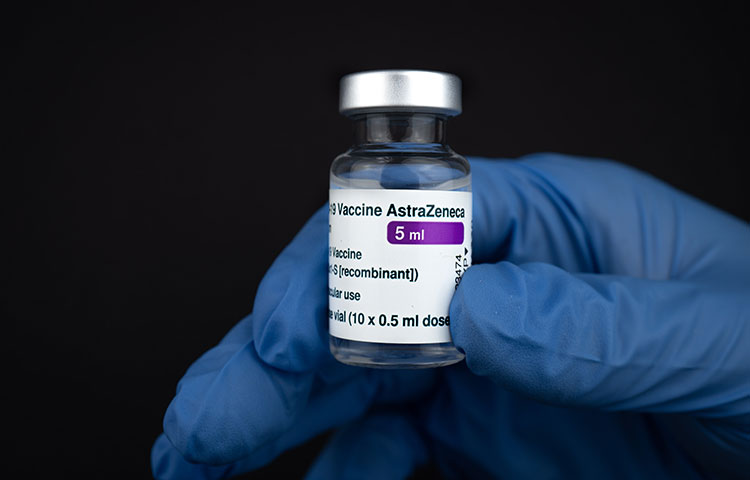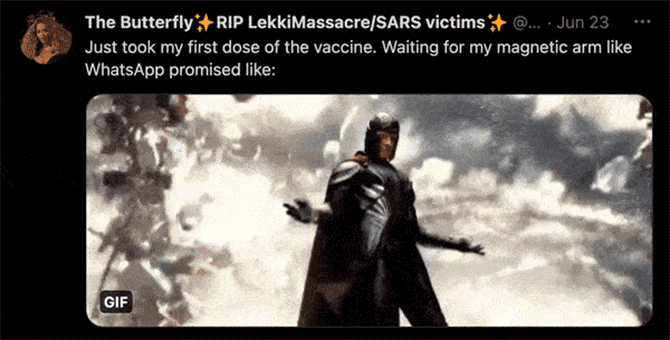Despite the efforts of global health regulatory bodies and our own JKJAV (Jabatan Khas Jaminan Akses Vaksin Covid-19) to disseminate science-backed information about Covid-19 vaccines, there’s still plenty of fake news circulating around today. At the rate they’re spreading, it’s almost like we need a mask or vaccine to protect us from fake news itself.
Unfortunately, some of these myths and conspiracy theories about Covid-19 vaccines are partially to blame for the slow registration and Covid-19 administration rates in Malaysia. From concerns about Covid-19 vaccines making us magnetic and infertile to them rewriting our DNA, we’ve just about heard it all.
So the next time you get a forwarded text about the preposterous side effects the Covid-19 vaccine *could* give you, reply with this article instead as we debunk the eight most popular myths out there about it.

Myth #1: “Vaccines can cause Covid-19”
Fact: None of the approved and recommended Covid-19 vaccines can cause Covid-19.
While some vaccines may lead to side effects such as fever, fatigue, nausea and so on, these are simply indicators that the body is building protection against the virus—not symptoms of the virus itself. This means that getting vaccinated won’t make you test positive for Covid-19 on PCR tests.
However, getting vaccinated does not fully guarantee that you won’t get Covid-19. It typically takes a few weeks for the body to develop immunity against the virus, which means that one could still get infected with Covid-19 just before or after getting a Covid-19 vaccination.
Cases of contracting or spreading Covid-19 after a full vaccination are very rare, but possible. These are called “vaccine breakthrough cases”, which are still being studied. Nevertheless, the evidence collected so far has shown that the “overall risk of hospitalisation and death among fully vaccinated people are much lower than among people with similar risk factors who are not vaccinated”.
Myth #2: “Some Covid-19 vaccines can cause blood clots”
Fact: To date, the AstraZeneca/Oxford and Johnson & Johnson/Janssen Covid-19 vaccines have been linked to blood clot cases, but these are very rare.
Both vaccines have reported cases of thrombosis with thrombocytopenia syndrome (TTS), a rare and serious condition that involves blood clots with low platelets, which has caused deaths. The AstraZeneca vaccine has reported 390 cases of blood clots out of 42.3 million doses administrated, while the J&J vaccine has reported 28 cases of blood clots out of 9 million doses. This translates to three to five blood clot cases per one million people for the respective vaccines. It’s much lower compared to the 39 blood clot cases reported per one million Covid-19 patients.
These cases have prompted investigations and halts/withdrawals of these vaccines in some countries. Nevertheless, the WHO and European Medicines Agency maintain that both vaccines are generally safe for the vast majority of people, unless otherwise recommended by your doctor/health professional.

Myth #3: “…but tons of people have died from the Covid-19 vaccine”
Fact: Cases of deaths after vaccination are very rare and except for the aforementioned blood clot-related cases, no causal relationship between vaccines and death has been established.
When reading reports on deaths from Covid-19 vaccines, it is imperative to look at things (especially numbers) in context. (Read: don’t jump into conclusions from headlines.) Don’t worry, we’ll break it down for you. Based on data from the Vaccine Adverse Event Reporting System (VAERS):
14 December 2020 – 21 June 2021
- 318 million doses of Covid-19 vaccines administered in the United States
- 5,479 reports of death (0.0017 per cent) among those people who received a Covid-19 vaccine
As of 25 June 2021
- 33,599,202 confirmed cases in the United States
- 603,474 deaths due to Covid-19, which equal to roughly 1.796 per cent
If you compare the two data above, both mortality rates are low, and even so, you’re more likely to die or experience life-long side effects from Covid-19 itself than from the vaccine.
To add, the FDA requires healthcare providers to report any death after Covid-19 vaccination, even if it’s unclear whether vaccines are the cause. It’s likely that some of these deaths are due to other underlying conditions. As mentioned, the only plausible causal relationship identified so far is between the AstraZeneca and J&J vaccines and TTS.
Myth #4: “Covid-19 vaccines make you magnetic”
Fact: All Covid-19 vaccines are free from metals and will not make you magnetic, not even at the site of your vaccination (usually your arm).
@ley2460
Reply to @clancp4 ##covidmagnetchallenge ##covidmagnet ##science ##notmagnetic ##covid19 ##covid ##covidvaccine ##covidvaccinemagnet ##foryou ##fyp
Sorry, but you can’t automatically gain a fraction of Magneto’s powers from a Covid-19 vaccine. There are no ingredients in any Covid-19 vaccine that will cause an electromagnetic field on your vaccination site. Moreover, Health reports that the typical dose for a Covid-19 vaccine is less than one millilitre, which is not enough to attract magnets even if a vaccine was filled with magnetic metals.
But what about those viral #covidvaccinemagnet videos you may have come across? There are several plausible explanations for them. For one, TikTokers fetching for views may be using transparent tape, glue or even body sweat to make a magnet stick. Others may suffer lockdown boredom and resort to practising a balancing act for their next (Zoom) party trick. It’s worth noting that most coins aren’t ferromagnetic (note: strongly attracted to magnets), so using them to “prove” magnetism just doesn’t hold (pun intended).
View this post on Instagram

Myth #5: “Covid-19 vaccines have a microchip tracker”
Facts: There are no microelectronics, electrodes, carbon nanotubes, and nanowire semiconductors whatsoever in any of the approved and recommended Covid-19 vaccines.
Conspiracy theorists have been spinning this facetious myth for years, jumping from one culprit to another. Covid-19 vaccines are the latest target, but like the magnet claim, their speculations have no basis. You’re far more likely to be tracked via your smartphone than by a Covid-19 vaccine that saves lives. But if you’re still sceptical, feel free to scrutinise the full list of vaccine ingredients on the CDC website here.
“I’m not getting a COVID vaccine so they can microchip me,” the man typed into his phone that tracks his every thought and constantly logs his location
— Otto Zone (@SortaBad) November 9, 2020
Myth #6: “mRNA vaccines can change your DNA”
Fact: Covid-19 vaccines do not change or interact with your DNA in any way.
There are two main types of Covid-19 vaccines: messenger RNA (mRNA) vaccines and a viral vector vaccine. Both mRNA and viral vector Covid-19 vaccines deliver instructions (genetic material) to our cells to start building protection against the SARS-CoV-2 virus. However, the material never enters the nucleus of the cell, which is where our DNA is kept. All Covid-19 vaccines work with the body’s natural defences to safely develop immunity to disease.
The vaccine is totally safe and effective but does have one small side effect pic.twitter.com/7BZYHB0z4s
— Slade (@Slade) December 17, 2020
Myth #7: “Covid-19 vaccines cause infertility and problems with pregnancy”
Fact: There is currently no evidence that Covid-19 vaccination causes any problems with fertility or pregnancy, including the development of the placenta.
In Malaysia, pregnant or breastfeeding women are eligible to register for Covid-19 vaccination. While no one can guarantee that there will not be any complications in pregnancy, this uncertainty should be weighed against the risk of contracting Covid-19 during pregnancy, which is far riskier for both mother and baby. In addition, there is no evidence to show that Covid-19 vaccines affect breastfeeding or future ability to conceive.
Myth #8: “Since Covid-19 has a high survival rate, vaccines are unnecessary”
Fact: Citing survival rate alone is ill-advised as it overlooks other health problems that may persist in survivors.
The mortality rate of Covid-19 varies and is influenced by age, gender, co-morbidities (underlying illnesses) and social contact. A study in the United Kingdom has found that more than half of Covid-19 patients had persisting symptoms three months after discharge from hospital, with worse outcomes among those below 50, women, and those with higher pre-Covid fitness levels.
Another study reported that discharged patients had higher risks of developing a respiratory disease (six times), major cardiovascular disease (three times), chronic liver disease (2.8 times), chronic kidney disease (1.9 times), and diabetes (1.5 times), than those who did not contract Covid-19 (at least, based on the control group from the said study).
In contrast, long-term effects of Covid-19 vaccination are still being studied, but the CDC states that “vaccine monitoring has historically shown that side effects generally happen within six weeks of receiving a vaccine dose”. Millions of people have received Covid-19 vaccines since the global rollout began last December, and no long-term side effects have been detected thus far.
BOTTOM LINE:
There is no perfect Covid-19 vaccine out there and concerns over the risks are understandable. With that said, global research groups and local regulatory bodies alike are confident that 1) vaccines are the best line of defence against the Covid-19 virus; 2) the likelihood of severe adverse events occurring after vaccination is low; and 3) the benefits of the vaccines far outweigh the risks.
If you or your dependent have not registered for the vaccination programme, you may do so here. If you have, it is still important to follow the SOPs and maintain good hand hygiene as there is a small chance of contracting Covid-19 even after vaccination.
You can also find out more information via the ‘Covid-19 National Immunisation Programme guidebook’ which you can download via the VaksinCovid website.
For more on the Covid-19 pandemic, click here.
| SHARE THE STORY | |
| Explore More |




